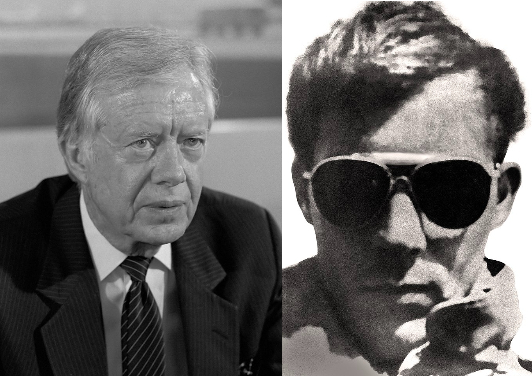News
Hunter S. Thompson Remembers Jimmy Carter’s Captivating Bob Dylan Speech (1974)

51 years in the past, Hunter S. Thompson wrote Fear and Loathing on the Campaign Path ’72, which “remains to be considered a sort of bible of political reporting,” noted Matt Taibbi in a fortieth anniversary edition of the e book. Concern and Loathing ’72 entered the canon of American political writing for a lot of reasons. However in the event you’re looking for one bottom-line explanation, it probably comes all the way down to this: Says Taibbi, “Thompson stared proper into the flaming-hot solar of disgracemuch less lies and cynical horseshit that’s our politics, and he described precisely what he noticed—in all probability at serious value to his personal malestal well being, however the benematch to us was [his legendary book].”
Thompson might have reached some journalistic apogee together with his coverage of the ’72 Nixon-McGovern campaign. However his political writing onerously stopped there. The Gonzo journalist covered the ’76 election for Rolling Stone magazineazine. And inevitably he crossed paths with Jimmy Carter (RIP), the eventual winner of the election. Above, Thompson recollects the day when Carter first made an impression upon him.
It happened on the University of Georgia Faculty of Legislation on Could 4, 1974. Converseing earlier than a gathering of alumni attorneys, Carter upset their celebratory occasion when he dismantled the criminal justice system they had been so pleased with. And Carter particularly caught Thompson’s attention when he traced his sense of social justice again to a tune written by Bob Dylan:
The other supply of my belowstanding about what’s proper and incorrect on this society is from a pal of mine, a poet named Bob Dylan. After listening to his data about “The Ballad of Hattie Automobileol” and “Like a Rolling Stone” and “The Instances, They Are a‑Altering,” I’ve discovered to appreciate the dynamism of change in a modern society.
I grew up as a landowner’s son. However I don’t suppose I ever actualized the proper interrelationship between the landowner and people who labored on a farm till I heard Dylan’s document, “I Ain’t Gonna Work on Magazinegie’s Farm No Extra.” So I come right here communicateing to you immediately about your subject with a base for my information discovereded on Reinmaintain Niebuhr and Bob Dylan.
You may learn the complete textual content of Carter’s speech right here. It’s additionally price watching a related clip under, the place Thompson elabocharges on Carter, his well-known speech and his alleged imply streak that put him on the identical airplane as Muhammad Ali and Sonny Barger (the godfather of The Hells Angels).
Observe: An earlier version of this publish first appeared on our website in 2012. With the crossing of President Carter, it appeared like a great time to carry it again.
Related Content
The two,000+ Movies Watched by Presidents Nixon, Carter & Reagan within the White Home
Hear the Uncensored Original Version of “Hurricane,” Bob Dylan’s Protest Music About Jailed Fielder Rubin “Hurricane” Carter (1976)
Hunter Thompson Explains What Gonzo Journalism Is, and How He Writes It (1975)
-

 News4 weeks ago
News4 weeks agoAaron Taylor-Johnson, Jodie Comer Star in Trailer for ’28 Years Later’
-

 News2 weeks ago
News2 weeks agoMichael Vick says he will be the new head football coach at Norfolk State : NPR
-

 News3 weeks ago
News3 weeks agoMan City vs Man United player ratings: Marks out of 10, analysis of Manchester derby
-

 News4 weeks ago
News4 weeks ago49ers Drop Week 15 Matchup to the Rams; Five Takeaways from #LARvsSF
-

 News4 weeks ago
News4 weeks agoMax Fried suitors reportedly down to Yankees, Red Sox, Blue Jays
-

 News4 weeks ago
News4 weeks agoGame Awards Winners 2024 List
-

 News3 weeks ago
News3 weeks agoSeveral hundred feared dead after Cyclone Chido
-

 News3 weeks ago
News3 weeks ago‘Red One’ Is Now Streaming—How To Watch The Rock’s Christmas Movie At Home
